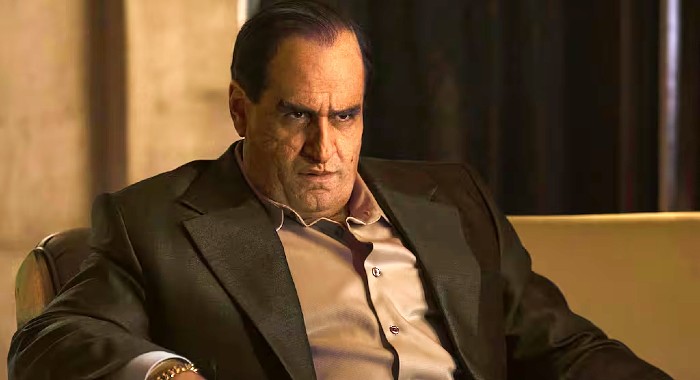

Edward Bernays is the Reason Why Americans Eat Bacon and Eggs for Breakfast
By Petr Navovy | Pajiba Storytellers | September 22, 2016 |
By Petr Navovy | Pajiba Storytellers | September 22, 2016 |
You might not know Edward Bernays, but Edward Bernays sure as hell knows you.

Do you like to have eggs and bacon for breakfast? If you do it’s because Edward Bernays told you so.
I know, I know, that’s preposterous — no-one tells you what to do! This is America! You’re one of the educated (or at least not-uneducated) class. Your opinions are your own. This is what you fought the Soviets over after all. The hammer of state propaganda belongs to despotic dictators; there are no mounted speaker systems on the corner of your street, blaring out diktats. There is no thought prison here.
No. No thought prison. Not quite anyway. But though a free-range chicken might well be better off than a battery-raised one, at the end of the day it sure as shit can’t decide to just wander off over the horizon on its own.
But before all that…


Vienna during the turnover from the 19th to the 20th century. A helluva place to be. With the strains of perpetual harpsichords drifting down the avenues and the pungent, ‘just pretend it’s not there’ stench of colonialism on the air providing the backdrop, the city was boiling over with culture. Ludwig Wittgenstein and the Vienna Circle were busy revolutionising philosophy; Richard Strauss and Johannes Brahms were repeatedly gracing lucky crowds with their sumptuous melodies; at one point Leon Trotsky, Joseph Stalin, and Adolf Hitler all lived within a few miles of each other in central Vienna; and in one corner of the city Sigmund Freud — powered by the sheer might of his intellect and, like, so much cocaine — was busy inventing psychoanalysis.
It was in this fertile environment that, as was fashionable at the time, a child was born to a man and a woman. A child whose ideas and methodologies would come to sprout great tentacles that would slither their way into ordinary people’s living rooms and wrap themselves around their minds. All without their consent or even knowledge.
Edward Bernays, nephew of the aforementioned Sigmund Freud, and founder — in as much as any field can be uniquely attributed to one person — of modern propaganda. Or, as he revealingly and rather more palatably termed it: public relations.
Bernays was born in 1891 and his family moved to New York from Vienna the following year. In 1912 he graduated from Cornell University with a degree in agriculture, but his initial career move was into journalism. Bernays’ first great triumph was during his time working with the Committee on Public Information under the Woodrow Wilson administration. Here he was extremely effective and influential in selling to the public the idea that America’s war efforts in Europe were driven above all else by the highest and most noble aspiration: ‘bringing democracy’ to the continent. A century on and those two words ring somewhat familiar, do they not?

Buoyed by his successful campaign, and astonished at just how effective the right combination of words and imagery could be at swaying the public, Bernays began wondering whether such tools could be used outside of wartime. After all, the great teeming mass of people that make up the general public has colossal power. If the people were to en masse decide on something then there is very little indeed that could stop the tide. But isn’t that inbuilt into the nature of democracy—that the people’s voice counts? Here is where Edward Bernays reveals himself as not just a visionary whose ideas would shape much of domestic Western policy for the 20th century and beyond, but as a curious and dangerous template for a certain type of ‘liberal’ that would come into great prominence as the century wore on. For Bernays wasn’t what we’d call a right-wing authoritarian. Again and again his ideas appeared to come not from a desire for power or a naked misanthropic hatred, but from the far more insidious, elitist ‘managerial’ belief that the public could not be trusted to make its own mind up about things, and that — on the contrary to the automatic assumption — propaganda was in fact a vital component of a healthy democracy. The herd must be herded for its own good.
In his own words, from his seminal 1928 work, ‘Propaganda’:
The conscious and intelligent manipulation of the organized habits and opinions of the masses is an important element in democratic society. Those who manipulate this unseen mechanism of society constitute an invisible government which is the true ruling power of our country. …We are governed, our minds are molded, our tastes formed, our ideas suggested, largely by men we have never heard of. This is a logical result of the way in which our democratic society is organized. Vast numbers of human beings must cooperate in this manner if they are to live together as a smoothly functioning society. …In almost every act of our daily lives, whether in the sphere of politics or business, in our social conduct or our ethical thinking, we are dominated by the relatively small number of persons…who understand the mental processes and social patterns of the masses. It is they who pull the wires which control the public mind.
Bernays would come to pioneer and utilise a dazzling array of effective skills and techniques in his efforts to bring about this invisible government. Using what he knew of psychoanalysis and group psychology, Bernays effectively laid the first stone in what would become the temple of modern Western consumer culture. Or, again, in his own words:
A single factory, potentially capable of supplying a whole continent with its particular product, cannot afford to wait until the public asks for its product; it must maintain constant touch, through advertising and propaganda, with the vast public in order to assure itself the continuous demand which alone will make its costly plant profitable.
Ironically, in championing the idea that the public must be fooled into confusing its wants for needs and thus creating the basis of so much capitalist churn, he went against one of the much-vaunted, key tenets of capitalism: the idea that markets should remain, as much as possible, supplied with good information. Befuddled consumers and distorted signals flood the system with bad information, but Bernays was no ideological capitalist — his raison d’être was the manipulation of public opinion, and if called on by a capitalist enterprise to do his thing, he would do his thing.
Bernays did not invent the press release, but he took the relatively blunt instrument that it was at the time and it he honed it like a motherfucker, quickly forging it into a swift and terrible sword. In the 1920s the American tobacco industry noticed that, as the sight of a woman smoking in public was still in many ways an arrest-worthy taboo, not enough women were smoking their cigarettes. So they turned to Bernays and his New York-based firm for help. Bernays conjured up a stroke of genius: he organised a procession of woman models into marching in the 1929 Easter parade through the city, holding aloft lit Lucky Strike cigarettes, which he dubbed ‘Torches of Freedom’, thus turning the act of buying and consuming a deadly product into a rebellious celebration of human rights. The event transformed the public’s attitude and many more women took up smoking. The other stroke of genius on Bernays’ part was creating a news-worthy event — he didn’t run a dry informational campaign, but instead created a striking public spectacle with symbolic imagery and a catchy slogan that the news media would pick up and report, essentially turning itself into a free advertising service. The false became real. (Incredibly emblematic of this flexible truth was the fact that Bernays himself was personally very much against smoking, trying multiple times to get his wife to stop, and later in life working with anti-smoking groups.)
But sexist smoking taboos were not to be the limit of Edward Bernays’ horizons. When the progressive democratic socialist, Jacobo Árbenz, was elected as president of Guatemala in 1951 on a platform of modernisation, nationalisation, and land reform, one major player on the scene found much to be displeased about. The American corporation, the United Fruit Company (today known as Chiquita Brands International) at the time owned vast tracts of Guatemalan land, and the local banana plantations accounted for more than a quarter of all of the corporations fruit production on the continent. Árbenz was no radical or revolutionary. He was a moderate with a democratic mandate, but obviously the threat that his land reform presented to United Fruit’s monopoly could not stand. Enter Edward Bernays. Hired by the fruit company, Eddie B. got to work, and his relentless propaganda painting Árbenz as a dangerous communist, repeated in major U.S. media outlets, eventually paved the way for a violent, American-sponsored coup that would depose Árbenz and in his place install a military junta. Forty years of brutal terror and violence ensued, but United Fruit’s profits were safe, and Edward Bernays, master PR man, had another notch on his belt.
Another of the key pillars that Bernays helped to build in his industry was based on his understanding of the power that an expert’s testimony can have on the public. And this is where we circle round to the eggs and bacon breakfast that we started with. Before Edward Bernays the typical American breakfast resembled a bit of toast with some coffee or juice. It was light and it was quick. By harnessing the power of third party expert testimonial — asking a group of physicians whether a more hearty breakfast was preferable to a light one, and receiving a positive response — he managed to pivot an entire nation’s perception, and got them to embrace the image of a powerful, eggs ‘n’ bacon start to their day. As Bernays said: ‘If you can influence the leaders, either with or without their conscious cooperation, you automatically influence the group which they sway.’
Edward Bernays, ad-man, elitist liberal, and father of modern propaganda sowed many seeds in his lifetime. A terrifying number of those seeds sprouted and grew offshoots that have tangled their way into every form of media; into domestic and foreign government policy; and into our very minds. Much of them go, to this day, completely undetected by the majority of those they affect the most. The people, uncritical and prone to irrational impulses, must be carefully herded for their own good. Democracy is under constant threat from democracy. ‘Invisible government’ indeed.
——————
Petr Knava lives in London and plays music
← Emma Watson Still Kicking Misogyny's Ass: College Edition | See This Stupid Necklace? It's $125. Thanks, John Mayer →
More Like This
The Scottish Workers Who Stopped Pinochet's Engines of War
Imre Nagy and the Hungarian Revolution | Through the Graves the Wind is Blowing
How Sheep Saved Civilization
Can We Talk About This Insane Murder Investigation Going on in Sweden Right Now?
When The Song Rings Out, We March: Remembering Portugal's Remarkable, Bloodless Carnation Revolution

Three Trailers: Polymorphic Pattinsons Vs. Bonkers 'Brothers' Brolin and Dinklage
A New Series Explores the ‘Chaos’ Behind Superhero Franchises
Robert De Niro Couldn't Remember His Lines While Shooting 'Joker'
RFK, Jr. Had an Affair with 31-Year-Old Journalist, Olivia Nuzzi
‘We Live In Time’ Inspired Florence Pugh to Prioritize Her Love Life
Elle King Says Rob Schneider's Apology 'Means Nothing'
Pajiba Love

Where Were You When You Learned About The Penguin's Dong?
Reviews